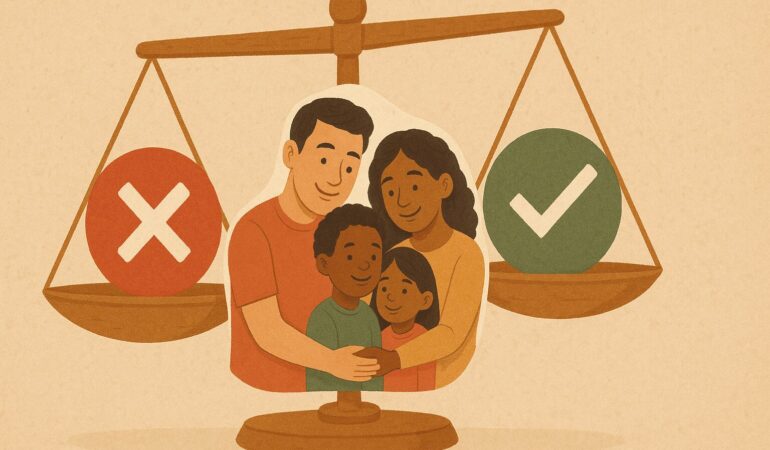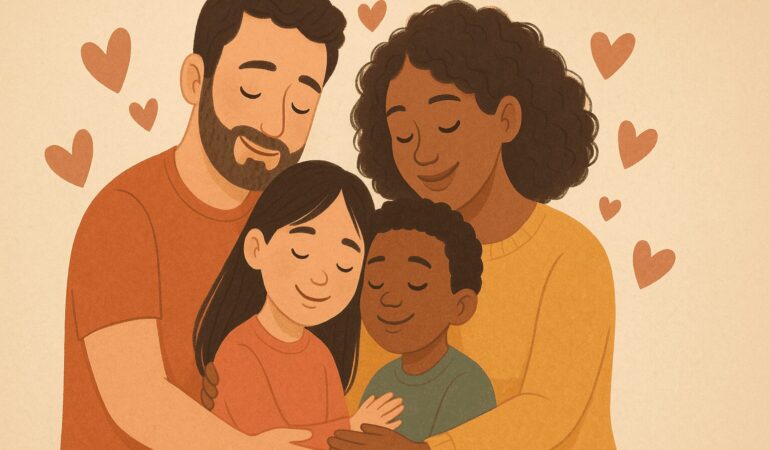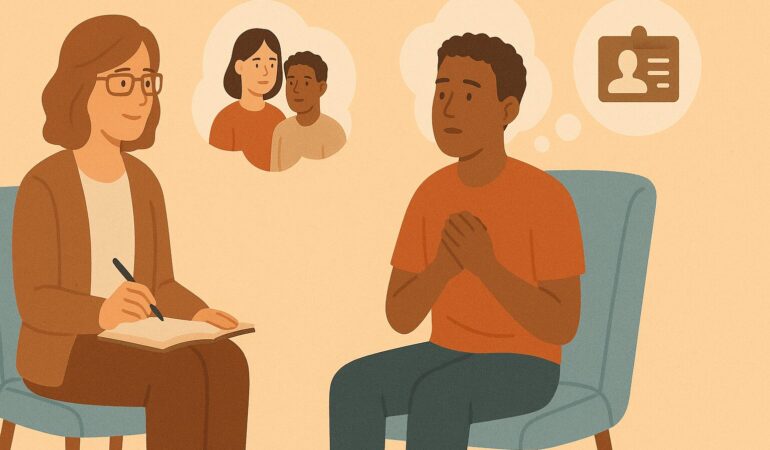The Pros and Cons of Adoption: What to Know Before You Choose
Adoption is one of the most meaningful — and complex — decisions a person or family can make. Whether you’re considering adopting a child or placing a child for adoption, this journey involves both love and loss, hope and uncertainty.
At Here Counseling, we’ve supported individuals, couples, and families navigating the emotional side of adoption. This article explores the real-life pros and cons of adoption — not to sway you in one direction, but to help you feel seen, informed, and supported no matter where you are in the process.
What Adoption Can Mean — A Quick Primer
“Adoption” isn’t a single path. There are several types, including private domestic infant adoption, foster-to-adopt, and international adoption. You’ll also hear terms like open adoption, where contact remains between birth and adoptive families, and closed adoption, where no contact or identifying information is shared.
Private domestic infant adoption, the most common in the U.S., usually involves a licensed agency guiding both the adoptive and birth parents. Foster-to-adopt and international adoptions often include different regulations, timelines, and emotional experiences — each with its own joys and challenges.
No matter the path, adoption always begins with courage — the courage to choose what feels best for the child at the center of it all.
The Pros of Adoption
A Child Receives a Life of Opportunity
One of the most beautiful aspects of adoption is the chance it gives a child to grow up in a loving, stable, and prepared home. Many adoptive parents have waited years to build a family, often through painful experiences with infertility or loss. Their readiness and emotional investment can create a nurturing environment for a child to thrive.
Birth Parents Find Support and a New Beginning
For birth parents, choosing adoption can be a deeply selfless act — one that reflects love, not abandonment. Many agencies and counselors provide resources, emotional support, and even financial assistance during pregnancy and beyond. While the grief that follows adoption is real, birth parents often describe peace in knowing they gave their child the life and opportunities they hoped for.
Adoptive Parents Get to Build the Family They Dreamed Of
Adoption allows hopeful parents to experience the joy of raising a child, something many thought might never be possible. Holding a child for the first time, celebrating milestones, and creating a shared story of love and belonging are among life’s greatest gifts.
Lifelong Relationships Can Grow Through Open Adoption
Open adoption has become more common, helping to maintain healthy connections between birth and adoptive families. This transparency benefits everyone involved — especially the child, who can grow up with a sense of identity, belonging, and understanding of where they come from.
When done thoughtfully and with mutual respect, open adoption can be a lifelong bridge built on honesty and love.
The Cons and Challenges of Adoption
The Grief and Loss Are Real
Even in the healthiest adoption stories, there’s loss. Birth parents may grieve deeply, even if they’re confident in their decision. Adoptive parents might experience their own sense of loss if they’ve faced infertility or long waits. And adoptees, regardless of how loved they are, may struggle with feelings of abandonment or identity confusion as they grow older.
This is why post-adoption counseling is so important — grief doesn’t disappear simply because an adoption is finalized.
The Process Can Be Costly and Complex
Private adoption can be financially demanding, often involving agency fees, legal processes, home studies, and medical expenses. While this helps ensure ethical, safe placements, the costs and paperwork can feel overwhelming.
Those seeking lower-cost options might explore foster-to-adopt programs, which come with their own emotional and bureaucratic challenges but can also provide loving homes for children who need stability.
Open and Closed Adoptions Both Have Difficulties
Open adoption can create tension if boundaries aren’t clearly defined or respected. Meanwhile, closed adoptions may leave unanswered questions for both the birth parents and the child. Neither is “better” — they simply carry different emotional dynamics.
Identity and Attachment Can Be Complex for Adoptees
Some adoptees grow up with questions about where they belong or why they were placed for adoption. Others may struggle with attachment, especially if they’ve experienced early trauma. These emotional patterns can emerge in childhood, adolescence, or even adulthood — and are best addressed with patient, trauma-informed therapy.
Perspectives from the Adoption Triad
Every adoption involves three core perspectives — the birth parents, the adoptive parents, and the adoptee.
Birth parents may feel pride, love, and heartbreak all at once. Adoptive parents often navigate gratitude and anxiety about “getting it right.” And adoptees, depending on their age and experience, may carry a mix of love and loss that evolves throughout their life.
No one in this triad is “wrong” for how they feel. Therapy provides a space to hold those truths with compassion and find meaning within them.
Agency Support vs. Therapeutic Support
Adoption agencies manage logistics: matching, legal steps, and financial processes. They’re vital partners in making adoption ethical and safe.
But once the paperwork is signed, the emotional story continues — and that’s where therapy steps in. At Here Counseling, we help individuals and families process the complex feelings that come with adoption: grief, attachment wounds, anxiety, and questions about belonging.
Agencies create families. Therapists help those families stay emotionally connected and resilient.
How Adoption and Mental Health Intersect
Adoption is more than a legal process — it’s a lifelong emotional journey. Therapy often supports:
- Adoptees exploring identity, belonging, and attachment.
- Birth parents are processing grief, guilt, or complicated emotions.
- Adoptive parents managing expectations, boundaries, and family dynamics.
Approaches such as attachment-based therapy, trauma-informed care, and family systems therapy can help everyone involved build understanding and healing.
Questions to Ask Before Choosing Adoption
Before taking the next step, it may help to ask yourself:
- What level of openness feels right for me — open, semi-open, or closed?
- Am I emotionally and financially ready for this commitment?
- What support systems will I have in place during and after the process?
- How will I navigate potential contact between birth and adoptive families?
- Do I have access to counseling or a community of others who’ve walked this path?
These questions aren’t meant to discourage you — they’re meant to help you move forward with clarity and confidence.
Post-Placement Support: What Comes Next
Adoption doesn’t end with placement; it evolves. Families often find new emotional challenges months or years later — especially around anniversaries, birthdays, or life transitions.
Post-placement therapy can help families maintain open communication, navigate grief, and strengthen the emotional bonds that make adoption thrive. Birth parents, too, often benefit from ongoing counseling as they redefine their sense of self and purpose after adoption.
At Here Counseling, we’re here to help at every stage — before, during, and long after the adoption process.
FAQs
What are the disadvantages of adoption?
Adoption can bring grief, emotional challenges, and high costs. For adoptees, identity and attachment issues can arise, which may require long-term emotional support.
Is adoption traumatic for the child?
Some adoptees experience early trauma or questions about identity, especially in closed or disrupted adoptions. However, with a loving home and supportive therapy, many thrive.
What is open vs closed adoption?
Open adoption allows for ongoing contact between birth and adoptive families; closed adoption does not. The best choice depends on each family’s needs and boundaries.
How can therapy help during adoption?
Therapy helps all members of the triad process emotions, build healthy attachments, and manage expectations — before and after adoption.
How much does adoption cost?
Private adoption often includes agency and legal fees. Foster-to-adopt programs typically have lower costs but may involve more uncertainty.
Moving Forward
Whether you’re an adoptive parent, a birth parent, or an adoptee, you don’t have to navigate this journey alone. Adoption can be both beautiful and painful — and both emotions deserve space.
At Here Counseling, we provide a safe, compassionate place to explore what adoption means for you and your family. Reach out today to learn how therapy can support you in building understanding, healing, and connection through every stage of the process.









